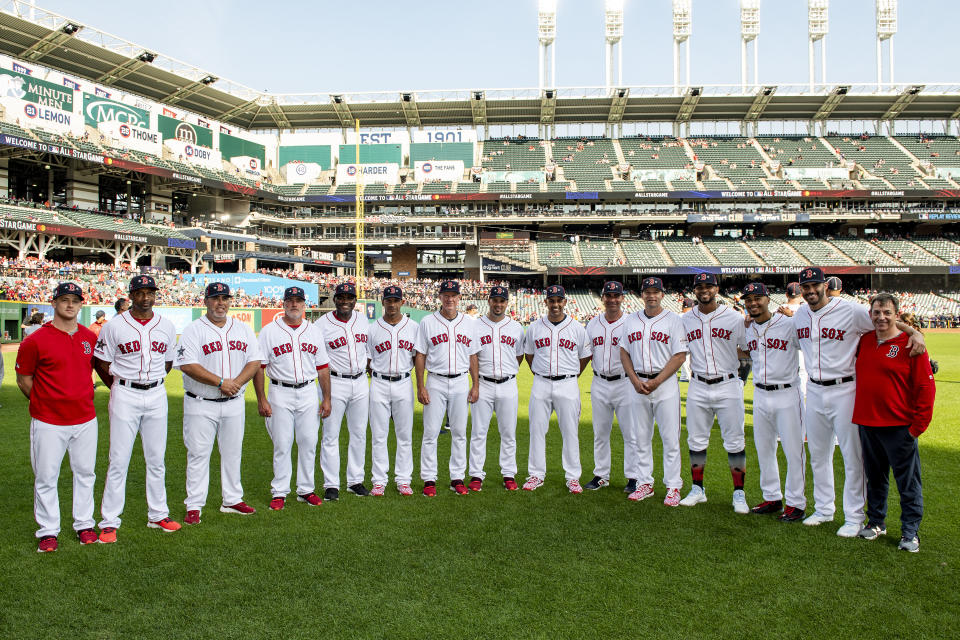Scapegoating staffer for Red Sox sign-stealing creates impossible choices in MLB's replay rooms
Well, now you know J.T. Watkins’ name, for the wrong reasons, as a 30-year-old Boston Red Sox staffer and the scapegoat for the team’s latest scrape with baseball’s elusory code of ethics.
As of Wednesday afternoon he was listed in the club’s front office directory as an advance scouting assistant — 11th, and last, under the heading of “Scouting.”
Across Major League Baseball’s 15-page report that concluded its investigation into the Red Sox’s illicit sign stealing in 2018, there were two names that would be significant. Alex Cora’s, who was cleared of wrongdoing in the matter of the Red Sox. And J.T. Watkins’, who was not.
Among Watkins’ roles, according to Wednesday’s report, was pregame scouting (and decoding) of opposing catchers’ signs and in-game manning of the team’s video replay review feed, which is live. MLB’s investigation found, despite Watkins’ claims otherwise, that those two roles blurred — that Watkins was also decoding in real time, then providing the information to Red Sox players.
The players, of course, were appalled to discover such an ethical breach and promised to use the deceit only until an MLB investigator knocked on the door, at which point they would have no choice but to nod in the direction of the West Point graduate who’d (allegedly) risked his $70,000 a year job and his burgeoning baseball career for the benefit of … them.
This is not to say J.T. Watkins did or did not do exactly what MLB found him guilty of. I was not there. This is, however, to suggest J.T. Watkins and the league’s 29 or so other replay staffers stand in a very delicate — maybe even impossible — position between the teams that pay their salaries (and the players with whom they live for eight or nine months) and the league that demands their loyalty in exchange for not being named prominently in a report headed, “Decisions and Findings of the Commissioner in the Red Sox Investigation.”
Watkins, from Daphne, Alabama, across the bay from Mobile, is the son of a baseball coach and scout. He played four years at West Point as a catcher and first baseman. He graduated, was drafted in the 10th round of the 2012 draft by the Red Sox and played a short summer of A-ball. He did not play baseball in 2013 or 2014, because he was busy being a field artillery officer at Fort Stewart in Georgia. He returned to play two more minor-league seasons, then, like his father, Danny, before him, began the baseball life.
This is how he found himself in a room with a live game feed and a telephone and, it would seem, with decisions to make about the information he would share and that which he would keep to himself.

Baseball organizations tend to find their own rhythms, so that no two operate in exactly the same way. It is fair to assume that not a single one has its shots called by an advance scouting assistant. Not a single one draws its character from an advance scouting assistant. Every once in a while one will win you a baseball game. But, then, hardly anyone will know about that.
In this case, some two years after the Red Sox won 108 games and the World Series with J.T. Watkins sitting in a room with a TV and a phone, the league claimed to interview 65 witnesses, including 44 current or former players, about what they knew and when they knew it. The only culpable party was Watkins, who, among them, was also most expert in the true diligence of chain of command. He was outranked by them all.
Watkins, per those who know him, is a “fantastic guy” and a “team guy” who became so stressed by the investigation that he lost weight. He has a sharp baseball mind, is inquisitive and in a conversation offers more questions than answers. He was committed to the Red Sox, same as his father.
He also is suspended for the season and cannot return to the role he was in for two seasons. He becomes the face of the scandal, because his was the only one offered. Perhaps he earned every bit of his punishment. That would depend on whether you were to believe him or at least some of the current or former players who were not named or punished.
The lesson, then, is for the 29 or so others around the league who man those rooms and answer those phones and try to help win games by those last few inches. That is, you can be loyal to the team and its players. Or loyal to the league and its rulebook.
And you’re probably screwed either way.
More from Yahoo Sports:

